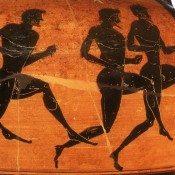Athletics in the Hellenistic Age, conference to be held 25-27 June 2015 in Mannheim, Germany.
In connection with the research project “The self-representation of Hellenistic athletes: social identities, political identities, ethnic identities”, financed by the DFG, the Ancient History Department of the University of Mannheim is organizing a conference on athletics in the Hellenistic period (25-27 June 2015, Mannheim).
Athletics in the Hellenistic age has thus far been relatively neglected in scholarship: there has not been even one monograph or edited volume on the subject. Historians of Greek athletics have traditionally focused on the classical period or, increasingly, on the Roman Empire. In the field of Hellenistic history, the complex meaning of gymnasia for Hellenistic society has received ample emphasis, but the agones have remained outside of the center of attention. This neglect is remarkable, as a deeper understanding of these contests has much to contribute to broader areas of research such as Greek identity in the Hellenistic period or the adaptation of the polis to the new political landscape after Alexander the Great.
The conference in Mannheim aims to establish the Hellenistic agones as a focus of scholarly attention, with a particular emphasis on the athletic and equestrian competitions, and to explore the continuities and discontinuities with the classical and imperial periods. Possible questions to be addressed are:
– How are we to understand the social position of Hellenistic athletes now that the traditional idea of a dichotomy between amateurs and professionals has become obsolete? What were the social backgrounds of athletes, and what opportunities for social mobility could athletics offer
– What was the significance of agonistic success for the Hellenistic kings? Why did some dynasties (the Ptolemies and the Attalids) participate with great enthusiasm in the agones, while others (the Seleucids and the Antigonids) seem largely absent in this field?
– How are athletes and contests represented in various textual and visual sources (epigrams, victor lists, reliefs, etc.)?
– In what ways and to what extent did agones enable the construction of an identity as ‘Greeks’ as distinct from ‘barbarians’, and in what contexts were non-Greeks able to enter Greek society through participation in athletics?
– Which meaning did sport have for the construction of masculinity in the Hellenistic period? And what was the significance of the participation of women in the contests?
– What was the relation between athletes and their home poleis? What did the agones mean for the Hellenistic polis societies? Can regional differences be observed?
All interested scholars are invited to submit an abstract (max. 500 words) by the 30th of November 2014. Abstracts can be written in any of the four languages of the conference (English, German, French or Italian) and should be sent by email to [email protected]. Decisions regarding the acceptance of proposals will be communicated in January 2015.
The papers will be published in an edited volume on athletics in the Hellenistic age.
For further information, please contact Prof. Dr. Christian Mann, Universität Mannheim, Historisches Institut, L 7, 7, D-68161 Mannheim, [email protected]


